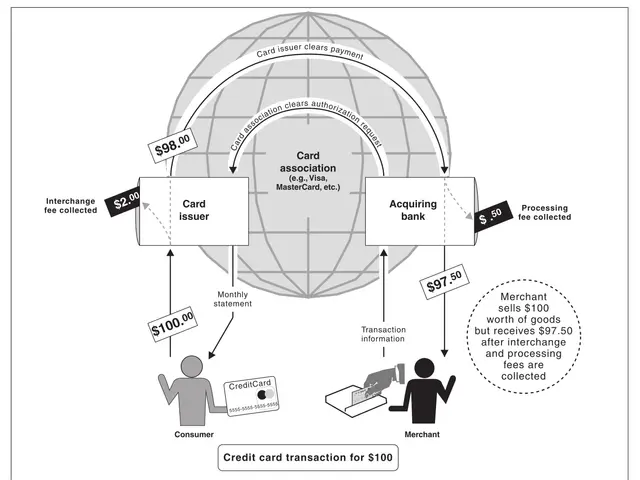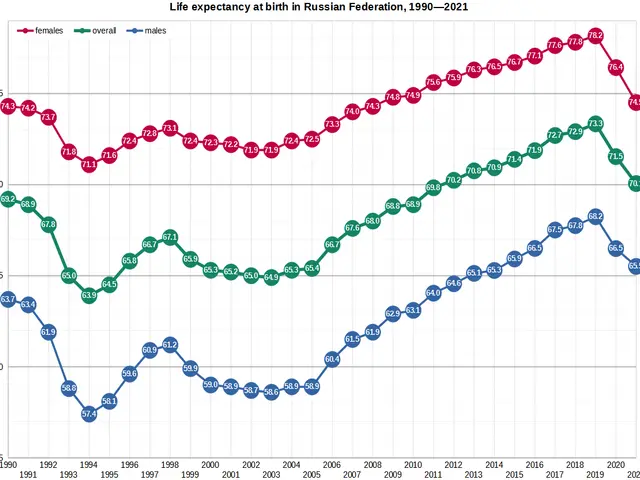Unprecedented Growth for Rheinmetall: War in Ukraine Triggers Record Defense Orders
Mounting order backlog poses imminent threat to erase $40 billion worth of assets
Heard the news? War in Ukraine and new political changes got some Western countries boosting their military spending big time. Guess who's reaping the benefits of this arms race? None other than Rheinmetall, the German defense giant.
This powerhouse company's CEO, Armin Papperger, sees a bright future for Rheinmetall, projecting staggering sales of over 40 billion euros by 2030. And that's no small feat considering they were only around 10 billion euros in 2024. So what's fueling such astonishing growth?
According to Papperger, the sky's the limit for this Düsseldorf-based DAX company if everything goes as planned. But let's be real, when has that ever stopped an ambitious CEO? Satellite production in Germany is one of the exciting developments on the horizon for Rheinmetall. Really, who wouldn't want to blast off into space?
In Q1, Rheinmetall's earnings were off the charts, with a whopping 108 million euros in earnings before interest and taxes (EBIT). Sales skyrocketed by 46% to 2.3 billion euros, with the military business growing a mind-boggling 73%. Incoming orders soared even higher, reaching a jaw-dropping 11 billion euros, mostly from the German military.
Rheinmetall is doing so well, they might just become a global defense champion if they're not already. But let's not get carried away – there's still work to be done if these targets are to be met.
A Budget Boost from the Old Continent
Let's face it, Putin's assault on Ukraine has been a turning point for the Western defense industry. With the world's eyes on this hot, conflict-ridden region, it's no wonder military suppliers are seeing green. To top it all off, Trump's been pushing NATO countries to hike their defense spending and move away from the fancy-schmancy democracies of Europe.
Thing is, NATO's Secretary-General, Mark Rutte, believes NATO countries should up their defense spending to a crazy 3.5% of their respective GDP. Right now, the target's a more modest 2%, but don't you monkey around with NATO, Mr. Rutte. Anyway, that's still a lot more than our current defense spending, so we might just see those numbers soar.
Papperger reckons there's an order potential of 300 billion euros from planned increases in defense spending in Germany and the EU. So, if Neuss's satellite-producing plants are to start operations in 2026, we might just see rockets blasting off left and right.
Rheinmetall is looking to expand its military production at the expense of its civilian production, particularly in the automotive industry. But don't worry; there'll be more missiles and spacecraft to make up for it. The company is even considering taking over plants from car manufacturers if the stars align and the price is right.
Rheinmetall's only downside in Q1 was a decline in sales in the civilian Power Systems sector due to the struggling automotive industry. Sales in this area fell by around seven percent to 505 million euros. The operating result shrank by an even more unpleasant 70.4 percent to nine million euros. But hey, who needs cars when you can have missiles, right? If the right buyer comes along, Rheinmetall might just offload this division.
Sources:
- ntv.de, als/rts
- "Impacts and Opportunities of the War in Ukraine for European Defense Industry," OECD, September 2015. (https://www.oecd-ilibrary.org/sites/535e05ca-en/index.html?itemId=/content/PDF/535e05ca-en)
- "Ukraine Defense Sector Review," UkraineInvest, May 2018. (https://investukraine.gov.ua/files/document/418/Ukraine-Defense-Sector-Review-2018-05.pdf)
- "Expanding the EU – NATO Defence and Security Cooperation," European Parliament, 2016. (https://www.europarl.europa.eu/RegData/etudes/briefing/2016/575518/EPRS_BRI(2016)575518_EN.pdf)
- "Europe's defense budget is going up: What you need to know," CNBC, December 2017. (https://www.cnbc.com/2017/12/13/europe-germany-defense-budget-military-spending-story.html)
Community policy regarding defense spending should consider the potential for increased vocational training programs in the aerospace industry, as evidenced by Rheinmetall's projected growth in satellite production and spacecraft manufacturing. In light of financial gains from defense orders, it is essential for departments of finance to provide adequate funding for vocational training programs to sustain this growth and maintain a competitive business edge.
Furthermore, the anticipated expansion of Rheinmetall's military production could lead to the acquisition of plants from the struggling automotive industry, shifting focus from traditional manufacturing sectors to the defense sector. Such a move could ultimately impact the overall economy, requiring careful consideration and strategic planning from various industries, including finance, business, and the automotive sector.







